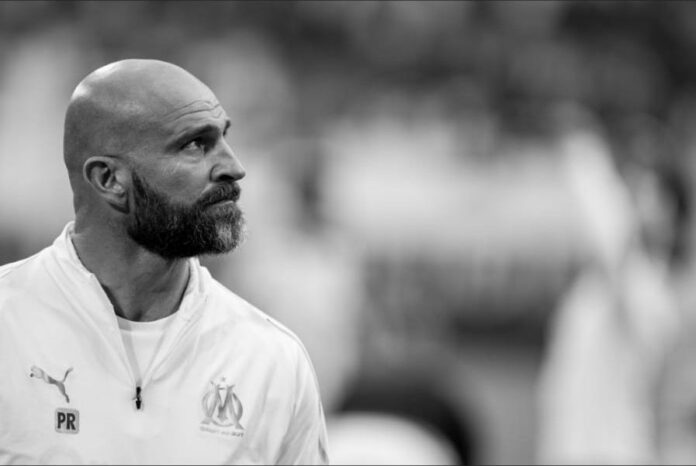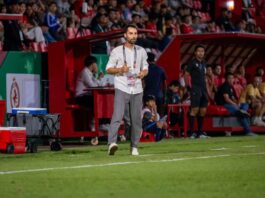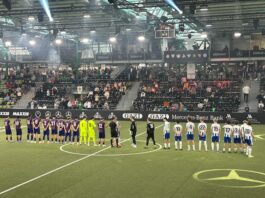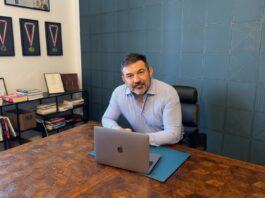
Paolo Rongoni is an elite football performance expert and sports scientist, currently serving as Head of Strength & Conditioning for the Algerian National Team. With a career spanning top European clubs including AS Roma, Olympique de Marseille, Olympique Lyonnais, and Al-Nassr FC, Rongoni is renowned for his innovative approach to physical preparation, load management, and player optimization. His philosophy blends cutting-edge sports science with human understanding, shaping modern performance culture across Europe, the Middle East, and Africa.
Current Role with the Algerian National Team
Paolo Rongoni, born in 1971 in Fermo, Italy, is the fitness coach of the Algerian National Team, overseeing player performance, physical preparation, and injury prevention at the highest international level. Since joining the Algerian Football Federation, he has implemented a comprehensive physical and medical monitoring protocol to evaluate player fitness, strengths, and recovery needs. His approach emphasizes transparency and collaboration, maintaining open communication with club fitness coaches, more and more of whom are his former students, to ensure coordination between club and national team workloads. Under his and the staff’s guidance, Algeria qualified for the FIFA World Cup after a twelve-year absence, a milestone that brought immense pride to the nation. He now focuses on optimizing the team’s performance for the Africa Cup of Nations and other major competitions.
Training Philosophy and Methods
Rongoni’s philosophy centers on adaptation rather than imposition. He believes that a national team fitness coach should not enforce a rigid methodology but instead tailor programs to the players’ individual needs and club routines. In his words, a national team does not develop players, it optimizes them. His method combines precision, personalization, and respect for each athlete’s existing rhythm, ensuring that players maintain balance and readiness during short international windows.
He defines his role as both scientific and human, monitoring training load, adjusting intensity, managing fatigue, and translating complex physiological data into practical football language that coaches and players can apply. Close collaboration with medical staff, physiotherapists, and coaches is central to his daily process.
“A national team does not develop players — it optimizes them.”
International Career and Cultural Experience
Rongoni’s career has taken him through several footballing cultures, including Italy, Switzerland, Turkey, France, Saudi Arabia, and now Algeria. Each country has shaped his understanding of performance and personal development. Italy taught him the technical foundations of physical conditioning. France strengthened his approach to athletic preparation in terms of running. Turkey exposed him to a more aggressive style of football, where adaptation was essential. Switzerland refined his sense of organization and discipline. His time in Saudi Arabia, working with Al-Nassr, introduced him to a new culture and working methods, which helped him adapt to his new role in Algeria more quickly.
Career Beginnings and Mentorship
Rongoni began his journey with Perugia after his physical fitness formation at the Italian Football Federation. Early in his career, he distinguished himself through the innovative use of muscle stimulation techniques, which were less common in football at the time. His first major mentor, Roberto Morinini, (Lugano, Servette) taught him how to plan training sessions carefully and how to maximize player performance while minimizing the risk of injury. In Switzerland, he had to place strong emphasis on injury prevention among key players, as the overall level would generally drop outside the starting eleven. Later, during his collaboration with Rudi Garcia, Rongoni developed a deeper understanding of workload management, GPS analysis, and biomechanics. His work with Vladimir Petković, the former coach of the Swiss national team, further refined his knowledge of the unique dynamics that define preparation at the national level.
Vision and Future Ambitions
With decades of experience across top leagues and national programs, Rongoni now aims to move into a Director of Performance role, either within a national team or a professional club. His long-term ambition is to mentor the next generation of performance specialists and to contribute to federation training programs, particularly within professional Fifa license courses. He is also keen to work alongside a young, ambitious coach, a former professional player looking to build a successful second career at Europe’s top level.
Guided by curiosity, precision, and a lifelong commitment to learning, Paolo Rongoni continues to embody the modern performance coach, uniting scientific rigor with human understanding to elevate football excellence.
“Paolo Rongoni continues to embody the modern performance coach, uniting scientific rigor with human understanding to elevate football excellence.”
Our exclusive interview with Paolo Rongoni
Your background is quite unique. Can you tell us about your training and the steps that led you to your first position as a fitness coach in a professional club?
My first position as a fitness coach in a professional club came after completing my training at the Italian Football Federation. A university friend who was already involved in football connected me with Perugia for an internship during my undergraduate studies. That experience gave me the opportunity to work with Perugia’s head coach, who at the time was also a lecturer in the professional coaching license program.
I started in Perugia during the 1994/1995 season. I was one of the few people using muscle stimulation techniques at that time. I had already worked with some of Perugia’s players during my studies, so I was familiar with the team before joining them officially.
You’re currently working with the Algerian National Team (FAF). What can you tell us about this new chapter and your ambitions?
I’ve discovered a completely new way of working in this role. To be honest, it wasn’t easy to leave the daily routine of club life and to no longer experience competition every three days, whether in the league, the Champions League, or the Europa League. I do miss that rhythm sometimes.
However, working with the national team has offered me a different quality of life, especially for my family. The approach to work is also entirely different: the performance window is short, over ten days of training and matches, so the main goal is not to build players over time but to optimize their condition to win matches, a completely different mindset.
At the federation, we have implemented a physical and medical monitoring protocol to better understand the strengths and needs of the players we select. I also maintain direct communication with many of them, some were players I previously coached at club level, including in France, which helps build strong relationships.
The first major goal was to qualify Algeria for the World Cup after 12 years, which was an immense joy and pride for the Algerian people. The next goal is to perform well at the Africa Cup of Nations (AFCON).
We also maintain transparent communication with club fitness coaches. Some clubs are very open, others less so. For instance, when we detect asymmetries between a player’s right and left leg during testing, we share this information, especially for younger players. It’s easier with clubs whose fitness staff I know well, and in fact, several of them are former students of mine.
How does physical preparation differ between a club and a national team? What specific adjustments do you have to make depending on the context and competition schedule?
In a national team, the key is not to be arrogant, it’s not about imposing your own methods, but adapting to the players. At every training camp, I ask for the players’ usual club programs and try to follow them as closely as possible. Of course, I sometimes make small adjustments, in posture, range of movement, or intensity, to better suit their individual physical characteristics.
I mainly focus on players who play very frequently or those with chronic issues, making sure to maintain their club routine. It can be challenging because every player follows a different program, but thanks to close coordination with the physiotherapists and assistant coaches, we manage to maintain a consistent and personalized approach.
With a national team, the preparation window is much shorter than in club football, we don’t develop players; we optimize them. My key role is to monitor training load, define intensity guidelines, manage space usage during sessions, and control fatigue levels throughout the camp.
You’ve worked in several countries, Italy, Switzerland, Turkey, France, and now Algeria. What drove you to work abroad, and how have these experiences shaped you?
When I moved to Switzerland, it was out of ambition. After my experience with Perugia in Serie A, the club wanted me to stay in their training setup. However, a Swiss player I worked closely with introduced me to an agent who offered me a head fitness coach position in a Swiss club. Since I wanted to remain in professional football, I accepted.
My move to France happened in a similar way, through my network of players and coaches. Each country has taught me something different: In France, there is a strong culture of running and athletic preparation. In Italy, the focus is on strength, power, and speed, areas where training is highly advanced. In Turkey, the game is much more aggressive, so adaptation is key.
Working in different countries has helped me understand various cultures and personalities, and not to take things personally or get easily offended.
My time at Al-Nassr in Saudi Arabia was also a major learning experience. I discovered the Saudi and Muslim culture, while simultaneously working with FIFA on the management of international referees in preparation for the World Cup in Qatar. The close relationship between Qatar and Saudi Arabia helped me secure the role at Al-Nassr. This experience in Saudi Arabia prepared me very well for my current position with the Algerian Football Federation.
You’ve had the opportunity to work with some of the top coaches in the world, such as Rudi Garcia. What are the most memorable lessons you’ve learned from working alongside these managers? Have there been any mentors who particularly influenced you?
The person who taught me the most is Roberto Morini, my first professional coach in Switzerland (at Lugano and Servette). He taught me how to plan training sessions and optimize performance while minimizing injuries, a key priority for Swiss clubs that often rely on a small core of starting players. I also learned a lot from the Swiss sense of discipline and organization, especially in managing details.
I learned a great deal from Rudi Garcia as well, he’s an intelligent coach with an excellent sense of human relations. He always gave me a lot of freedom in my work. After several years working together, sharing both successes and setbacks, we developed very precise methods concerning workload management, GPS analysis, and biomechanics. Thanks to him, I learned how to better balance physical effort depending on player profiles, especially during intense European seasons.
My current coach with Algeria, Vladimir Petković, who led the Swiss national team for many years, has taught me how to work effectively within the unique context of a national team. I’ve also had the chance to collaborate with several top French coaches who helped refine my game reading and tactical understanding.
The world of physical preparation is very specific, it’s based on clear physiological principles that can sometimes be complex. The fitness coach’s role is to simplify those concepts and translate them into football language so that coaches can easily understand and apply them on the pitch.
What are your ambitions for the future of your career?
My goal is to perform at the World Cup and go as far as possible with the national team.
Since most of my career has been in clubs, I now aim to move into a Director of Performance role, either with a national team or a professional club.
I would also like to work alongside a young, ambitious coach, a former professional player looking to build a successful second career.
Finally, I want to share my knowledge, by mentoring young professionals in their development and by teaching in federation training programs, particularly within professional coaching license courses.



